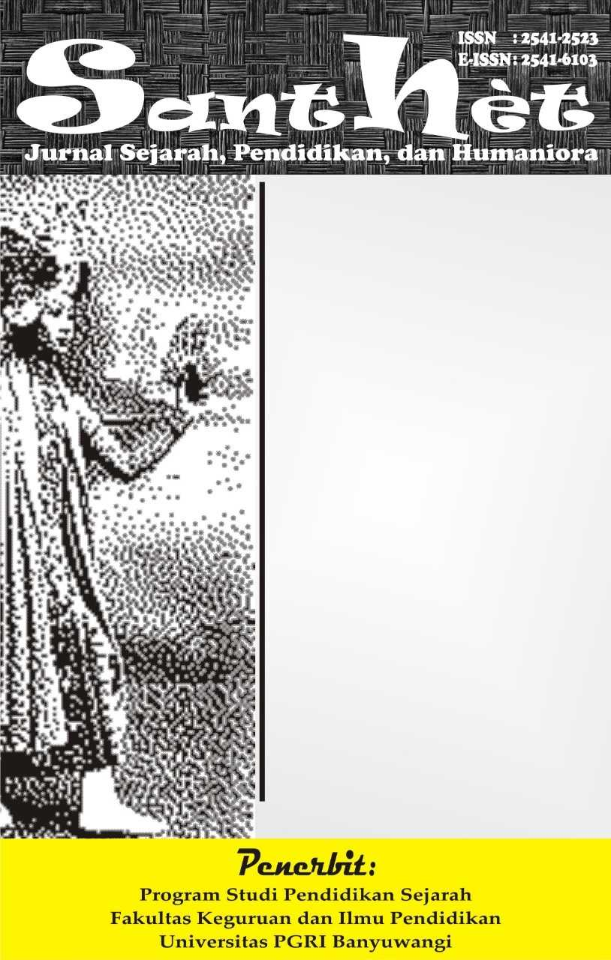Reverse Culture Shock Shaping Personal Traits and Views: A Case Study of Malang Returnees from Surabaya
KEJUTAN BUDAYA TERBALIK YANG MEMBENTUK PANDANGAN DAN KEPRIBADIAN: STUDI KASUS PERANTAU MALANG DARI SURABAYA
DOI:
https://doi.org/10.36526/santhet.v9i4.5649Keywords:
Reverse culture shock, Malang, TraitsAbstract
Reverse culture shock is the next level of culture shock phenomenon that is commonly caused by asymmetric locations and frequently happens to sojourners returning to their homeland. Cities like Malang and Surabaya are examples of asymmetrical locations that are highly contrasted in terms of life pace as Malang is slow-paced while Surabaya is fast-paced. This circumstance potentially establishes such culture shock phenomena. This study, therefore, aims to examine the culture shock and reverse culture shock phenomena experienced by sojourners by focusing on its influence in shaping their personal traits and views. This study is categorized as qualitative research. The data collection technique is in the form of interviews with the sojourners who have met the criteria. This study applied Mizerow’s theory of transformative learning to analyze the data. The result of this study reveals that all participants had undergone both culture shock and reverse culture shock experiences. They also showed indications of which phenomena have influenced their personal traits and views in certain perspectives, specifically in shaping gratitude traits..
References
Alkhalaf, K., Al-Krenawi, A., & Elbedour, S. (2024). Reverse Culture Shock among Saudi Students Returning from the US to Their Homeland. Journal of International Students, 14-4, 741-759.
Amril, O., Elfiondri, Irma, & Kartika, D. (2022). Cultural Intelligence And Resistance to Reverse Culture Shock : The Case of International Students Internship in Japan. Jurnal Kata : Penelitian tentang Ilmu Bahasa dan Sastra, 6-1, 88-100.
Athallah, M. A., & Dharma, F. A. (2024). Strategi Komunikasi Pekerja Migran Indonesia dalam Mengatasi Culture Shock Selama Bekerja di Jepang. Academic Journal of Da’wa and Communication, 5-1, 81-104.
Brown, C. (2023, September 6). “We Can’t Live Freely In Its Current Inhospitable State": People Who Have Lived Abroad Are Sharing Their Experiences With Reverse Culture Shock When They Finally Returned Home. Retrieved from BuzzFeed Inc.: https://www.buzzfeed.com/consheabrown1/expats-are-sharing-reverse-culture-shock-experiences
Burns, N., & Grove, S. K. (2009). The Practice of Nursing Research: Appraisal, Synthesis, and Generation of Evidence (6th Ed.). St. Louis: Saunders.
Chubb, H. (2023, October 28). Reverse culture shock is the dark side of living abroad that no one talks about. Retrieved from Harper's Bazaar India: https://www.harpersbazaar.in/culture/story/reverse-culture-shock-is-the-dark-side-of-living-abroad-700696-2023-10-28
EL-Asri, S., Karfa, A. E., & Farhane, H. (2014). Dealing with Reverse Culture Shock after Cultural Exchange: Contributing Factors and Coping Strategies. Journal of Psychology and Behavior Studies, 51-56.
Ely, M., Anzul, M., Freidman, T., Garner, D., & McCormack-Steinmetz, A. (1991). Doing Qualitative Research: Circles within Circles. London: Falmer Press.
Fanari, A., Liu, R. W., & Foerster, T. (2021). Homesick or Sickof-Home? Examining the Effects of Self-Disclosure on Students’ Reverse Culture Shock after Studying Abroad: A Mixed-Method Study. Journal of Intercultural Communication Research, 1-31.
Frazier, M. K., & Kasten, S. (2015). Reverse Culture Shock: The Purdue Kenya Partnership. Purdue Journal of Service-Learning and International Engagement Purdue Journal of Service-Learning and International Engagement, 2-1, 6-9.
Gaw, K. F. (2000). Reverse culture shock in students returning from overseas. International Journal of Intercultural Relations, 24(1), 83-104.
Junaid, S., Andini, C., Atsyania, N. A., & Rahmawati, A. N. (2024). Exploring Rani Mehra’S Culture Shock In Queen (2014) Movie Through theLensofSverre Lysgaard’S U-Curve Theory. ELS Journal on Interdisciplinary Studies in Humanities, 7-3, 475-489.
Karadag, E., & Almukdad, M. (2024). Culture Shock among International Students in Turkey: An Analysis of The Effects of Selfefficacy, Life Satisfaction and Socio-Cultural Adaptation on Culture Shock. BMC Psychology, 12-154, 1-12.
Kartoshkina, Y. (2015). Bitter-sweet reentry after studying abroad. International Journal of Intercultural Relations, 44, 35-45.
Laili, N., Pawito, & Hastjarjo, S. (2024). Reverse Culture Shock Phenomenon among Al Azhar Students in Egypt. Proceeding Ahmad Dahlan International Conference on Communication and Media, 2-1 (pp. 467-478). Surakarta: Universitas Sebelas Maret.
Mezirow, J. (1991). Transformative dimensions of adult learning. Jossey-Bass.
Mezirow, J. (1997). Transformative learning: Theory to practice. New Directions for Adult and Continuing Education, 1997(74), 5-12.
Mezirow, J. (2000). Learning as transformation: Critical perspectives on a theory in progress. Jossey-Bass.
Mezirow, J. (2018). Transformative learning theory. In K. Illeri, Contemporary Theories of Learning (pp. 60-68). London: Routledge.
Mohajan, H. K. (2018). Qualitative Research Methodology in Social Sciences and Related Subjects. Journal of Economic Development, Environment and People, Vol. 7, No. 1, 23-48.
Otuogha, A. M., Udoudo, A. J., & Ochonogor, C. I. (2024). Communication Culture Shock and Adaptation Strategies among Nigerian Undergraduate Students in Scotland, United Kingdom. International Journal of English Language and Communication Studies, 9-3, 17-36.
Presbitero, A. (2016). Culture shock and reverse culture shock: The moderating role of cultural intelligence in international students' adaptation. International Journal of Intercultural Relations, 53, 28-38.
Salsabilla, A. M., & Keliat, C. (2023). Overcoming The Reverse Culture Shock Experience in Indonesian Children of Diplomats From Living Overseas During Primary School Years. Jurnal Scientia, 12-3, 1389-1401.
Wielkiewicz, R. M., & Turkowski, L. W. (2010). Reentry issues upon returning from study abroad programs. Journal of College Student Development, 51(6), 649-664.





























